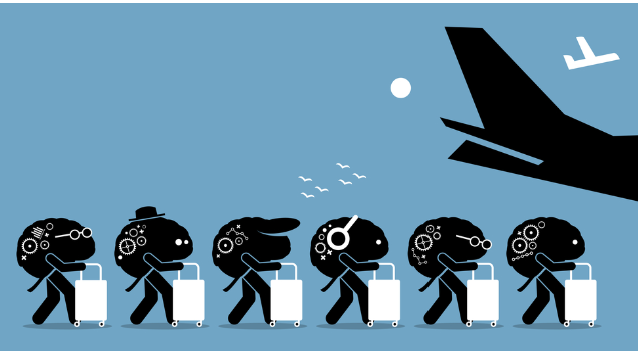Turkish academics who had gone abroad for better working conditions or those living in exile have brushed off a call from President Recep Tayyip Erdoğan calling an academics abroad to return home and “take part in the country’s development,” saying their return is impossible as long as Erdoğan’s government continues to limit freedoms in the country, Turkish Minute reported. Brain drain at all levels of the society is becoming a serious problem for the country, as from businesses setting up shop in Middle East and central Asia to escape a dear currency, to 75% of the youth according to surveys who wish to depart as soon as possible because of a lack of job opportunities to academicians seek their fortunes abroad.
The
shortage of academicians is in particular a grave problem, as Erdogan allowed universities to proliferate across the country, many of which can’t offer basic education. Turkey’s official goal for this century is to become a “high technology society”. Recent PISA scores the country is light years away from achieving one of the more important milestones in this quest, namely better education.
While many leave for better economic prospects abroad, a substantial portion do so because they can’t abide by Erdogan’s strong-man rule.
The president once again invited scientists who had moved overseas to come back to Turkey in an attempt to reverse the brain drain from the country during an address to a group of scientists in the Turkish capital of Ankara in a speech given in the closing days of 2023.
“If we want a fully independent Turkey, we need to aim for the top in science and technology. It’s very important that scientists who have done their academic and scientific studies abroad return home and support the development of their country,” Erdoğan said, adding that 199 scientists have returned to Turkey so far as part of a program launched for that purpose.
Why should academicians return, when they can’t exercise their profession?
Professor Mehmet Efe Çaman, one of the thousands of academics who were fired from their jobs in Turkey by government decrees in the aftermath of an abortive putsch on July 15, 2016, said on X that he made the mistake of returning to Turkey in 2005, when he left Germany with his family to continue his academic work in Turkey, and regrets that decision.
He said in return for his idealism and nine years of academic work, he was “betrayed” by the country, the government and the society he had served, declared a “traitor” and together with his family was effectively deprived of all citizenship and human rights.
“Now, as a Canadian citizen and a professor at a Canadian university, I would like to put it in language that you can understand: Take your sham of a state and your disgraceful universities! Damn you, your society that supports you and your primitive culture. My advice to young academics is never to make the mistake of returning to Turkey,” Çaman said.
Turkey’s academic freedom has sharply declined in the last decade, putting Turkey in 166th place out of 179 countries as of December 2022, according to a recent update to an index prepared by German and Swedish scholars.
According to the Academic Freedom Index (AFI), which assesses de facto levels of academic freedom around the world, Turkey is in the bottom 10 percent with a score of 0.08 out of 1, putting it just ahead of countries with strict restrictions such as North Korea, Myanmar and Iran. The country ranks behind Tajikistan, Russia and Bangladesh.
According to OECD, Türkiye is one of only a handful of countries whose PISA results improved, over a period of more than 10 years, in most subjects. But, Students in Türkiye scored less than the OECD average in mathematics, reading and science.
A smaller proportion of students in Türkiye, than on average across OECD countries, were top performers (Level 5 or 6) in at least one subject. At the same time a smaller proportion of students than on average across OECD countries achieved a minimum level of proficiency (Level 2 or higher) in all three subjects.
Turkey ranked 39th in PISA league, improving her standing by 3 ranks vs 2018.
Poor education shows up in Turkey’s capacity to invite. According to 2023 Global Innovation Index, Turkey’s standing improved from 51st to 39th in the brief span of 5 years, but Türkiye ranks lowest in Institutions (105th), Infrastructure (50th) and Business sophistication (46th). It looks like Turkey is ready to soar in terms of innovation and productivity, but the regime is holding her back.
Follow our English language YouTube videos @ REAL TURKEY: https://www.youtube.com/channel/UCKpFJB4GFiNkhmpVZQ_d9Rg
And content at Twitter: @AtillaEng
Facebook: Real Turkey Channel: https://www.facebook.com/realturkeychannel/
PA Turkey staff
